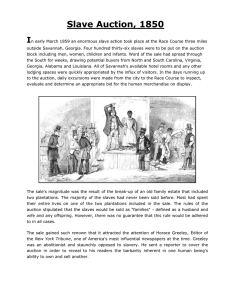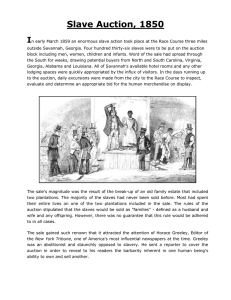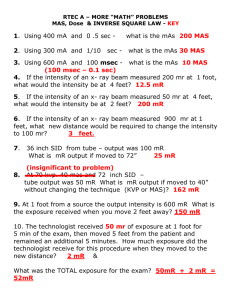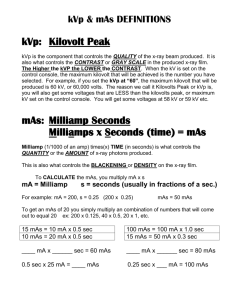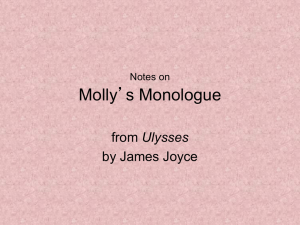DouglassPPT
advertisement
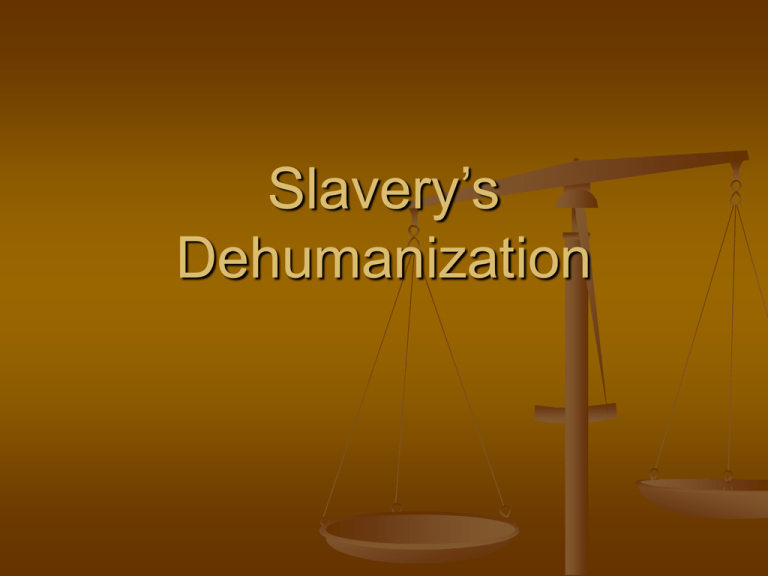
Slavery’s Dehumanization One Account Mr. Burwell came to the cabin, with a letter in his hand. He was a kind master in some things, and as gently as possible informed my parents that they must part; for in two hours my father must join his master at Dinwiddie, and go with him to the West, where he had determined to make his future home. I can remember the scene as if it were but yesterday; - how my father cried out against the cruel separation; his last kiss; his wild straining of my mother to his bosom; the solemn prayer to Heaven; the tears and sobs - the fearful anguish of broken hearts. The last kiss, the last good-by; and he, my father, was gone, gone forever. Keckley, Elizabeth, Behind the Scenes, or Thirty Years a Slave and Four Years in the White House (1968, republished 1988). This picture is a contemporary sketch of a plantation. This picture reflects a common working day. Chattel vs. Cattle What’s the difference? What effect does the word chattel have on us today? “'Elisha,' chattel No. 5 in the catalogue, had taken a fancy to a benevolent looking middle-aged gentleman, who was inspecting the stock, and thus used his powers of persuasion to induce the benevolent man to purchase him, with his wife, boy and girl, Molly, Israel and Sevanda, chattels Nos. 6, 7 and 8.” New York Daily Tribune, March 9, 1859 reprinted in Hart, Albert B., American History Told by Contemporaries v. 4 (1928). On the Selling Block 'Look at me, Mas'r; am prime rice planter; sho' you won't find a better man den me; no better on de whole plantation; not a bit old yet; do mo' work den ever; do carpenter work, too, little; better buy me, Mas'r; I'se be good sarvant, Mas'r. Molly, too, my wife, Sa, fus rate rice hand; mos as good as me. Stan' out yer, Molly, and let the gen'lm'n see.' Molly advances, with her hands crossed on her bosom, and makes a quick short curtsy, and stands mute, looking appealingly in the benevolent man's face. But Elisha talks all the faster. 'Show mas'r yer arm Molly - good arm dat mas'r - she do a heap of work mo' with dat arm yet. Let good mas'r see yer teeth Molly - see dat mas'r, teeth all reg'lar, all good she'm young gal yet. Come out yer Israel, walk aroun' an' let the gen'lm'n see how spry you be.' New York Daily Tribune, March 9, 1859 reprinted in Hart, Albert B., American History Told by Contemporaries v. 4 (1928). In Bondage & In Freedom Always in Fear On May 24, 1854, after only three months of freedom, Anthony (a former slave) was sighted by a slave hunter, immediately imprisoned and taken before a court where his fate would be decided. His incarceration sparked outrage among the citizenry of Boston. This seething anger came to a head three nights later when an angry mob stormed the Court House where he was being held in an attempt to free the hapless prisoner. They were unsuccessful. Efforts were then made to secure the slave's freedom by buying him from his master. But this too was unsuccessful. "Return of a Fugitive Slave, 1854", EyeWitness to History, www.eyewitnesstohistory.com (2005). Always in Fear At eleven o'clock, Court Square presented a spectacle that became indelibly engraved upon the memories of men. The people had been swept out of the Square, and stood crowded together in Court street, presenting to the eye a solid rampart of living beings. At the eastern door of the Court House, stood the cannon, loaded, and with its mouth pointed full upon the compact mass. By its side stood the officer commanding the detachment of United States troops, gazing with steady composure in the same direction. It was the first time that the armed power of the United States had ever been arrayed against the people of Massachusetts. Men who witnessed the sight, and reflected upon its cause, were made painfully to recognize the fact, before unfelt, that they were the subjects of two governments. Frederick Douglass What kind of woman does Mrs. Auld appear to be? What part does Mr. Auld play in her character? How do you view Douglass’s character? What does he write that illustrates this view? How does Douglass use irony to reinforce slavery's dehumanizing influence?
